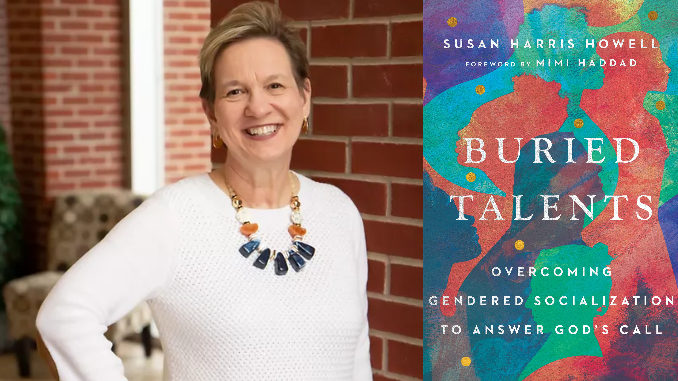
Podcast (beyond-the-page): Play in new window | Download
Subscribe: Apple Podcasts | RSS
If God is calling women to lead, what’s holding them back? Susan Harris Howell has spent her academic life investigating this question and the answer that she’s come to is gendered socialization. That is, society has preconceived ideas about what toys, jobs, behaviors, and clothes fit which gender. The result has been that, societally, men are more likely to lead because society has socialized them to be leaders. To get a better idea of this, I had a conversation with Dr. Howell.
The Conversation
This transcript may be lightly edited for clarity and content.
Josh Olds: The big term to make sure that everybody understands is “gendered socialization.” Half the book is dedicated to explaining what that means, what that looks like in childhood, adolescence, adulthood—there’s a chapter for each of them. So to make sure everyone is clear, what does that term mean?
Susan Harris Howell: Gendered socialization can mean a lot of things. It can mean anything that is as overt as our parents, or teachers or the media telling us, “You’re a boy, you’re a man, you need to be doing these things, or you shouldn’t be doing those things.” Or because you’re a woman or girl, you should or shouldn’t be doing a variety of things. But it also can be things that are very subtle, and this is really what my book focuses on. Because we’re typically aware of those overt ways. But I look at very subtle gendered socialization. Like, for instance, the way our language very often will use the word he or him when referring to people whose gender is not known. That would be a very subtle way that we might be communicating to girls and women that they’re second class, that they’re not the main attraction, that this is a man’s world, and that we’re just here on the sidelines. So my book looks at gendered socialization as anything that happens, that tends to channel us in a certain way, simply because we’re a boy or a girl, a man or a woman.
Josh Olds: What sort of inequalities do we find coming out of gendered socialization?
Susan Harris Howell: Well, for one thing, the mindset that it creates in men and women and boys and girls, and then later men and women. For instance, one of the lines of research that I talked about in the book is some research that shows parents and teachers are more likely to believe that if a boy does really well, say on a math or a science test—something that is very often stereotypically seen as a boy thing—whenever he does really well, they’re more likely to tell him, “Wow, you’re really smart.” And then if their daughter does well, on one of those math or science tests—something that is stereotypically thought of as a guy thing—they’re more likely to tell her, “Wow, you really worked hard.” And while both of those are compliments, and both are probably true, most of the time, usually, if we do well, on any kind of a test, it’s partly because we’re smart, and partly because we’ve worked hard, but the fact that they give different messages to boys and girls is very telling.
Because if you tell someone that they did well because they’re smart, what that communicate is that they’re doing well is part of who there is part of their essence, part of who they are. And then it’s very likely to be repeated. Because if you’re smart today, you’re likely going to be smart, tomorrow, next week, and next month, and so on. But when we tell a little girl that she did well, because she tried hard, it communicates to her, that it’s not so much who she is. But what she did in this one situation. And so it communicates to her that the next time. For instance, if she doesn’t have as much time to study, or if the subject is just a lot harder, that her inborn intelligence, the essence of who she is, might not be enough to get her through.
So for instance, how that could play out then, is for whenever boys and girls get older, they go to high school, they go to college, they’re in some classes that are going to be pretty tough. If the boy is telling himself, “I can do this, I’m smart.” And she’s telling herself, “I could do this if I had the time to devote to it, but I don’t. So I can’t,” then that’s going to have some serious ramifications for the types of subjects that she might major in, for instance, when she gets to college, and that will then open up or close off opportunities for her in certain occupations.
And we also tend to communicate, like I said, with the the toys and gearing boys toward outside of the home activities. And girls toward inside the home activities. What that can lead to that I think is pretty damaging, is for a man then to just feel more comfortable being outside of the home and pursuing his contribution to the family outside the home. Very often what that will lead to are people saying things like, Well, men are just more comfortable going out to work everyday. Men just aren’t comfortable staying at home, or women are just better at being at home that men or women are just better at handling children or doing the washing and the cooking and so on. When really it’s not so much that men are just better at this or women are just better at that. It’s that they’ve been conditioned through decades of their lives, where he has been pushed outside the house to pursue sports, vehicles, jobs, occupations, and so on. And she’s been geared toward inside the home activities. So in in both of those areas, whether we attribute the child’s success to smart or hard work, and whether we tend to gift them with sports equipment, or dolls and dishes. All of that becomes pretty significant as they get older in the beliefs that they develop about where they need to be spending their time.
The Book | Buried Talents
 If God is calling women to lead, what’s holding them back? Susan Harris Howell has spent years helping students investigate this question. In Buried Talents, she makes clear how gender disparity in leadership is directly connected to a larger, less overt issue: gendered socialization. Howell examines gendered messages people encounter inside and outside the church in each stage of life, showing how they often create misconceptions about who women are, what they’re capable of, and how they fit into God’s work. As these messages pull men toward leadership, they push women away from it. God’s call to leadership doesn’t come in a vacuum. It comes to particular people who have, from childhood through adulthood, been shaped by subtle forms of socialization. Using social science research and interviews to explain these forces, Howell offers psychological and practical tools for both women and men to make more balanced vocational decisions. A discussion guide and suggested reading lists are also included to help readers engage and apply the content. As opportunities for women continue to expand, too many still hold back in responding to God’s call. Buried Talents provides compelling guidance for how we can remove obstacles that keep women from fully using their gifts.
If God is calling women to lead, what’s holding them back? Susan Harris Howell has spent years helping students investigate this question. In Buried Talents, she makes clear how gender disparity in leadership is directly connected to a larger, less overt issue: gendered socialization. Howell examines gendered messages people encounter inside and outside the church in each stage of life, showing how they often create misconceptions about who women are, what they’re capable of, and how they fit into God’s work. As these messages pull men toward leadership, they push women away from it. God’s call to leadership doesn’t come in a vacuum. It comes to particular people who have, from childhood through adulthood, been shaped by subtle forms of socialization. Using social science research and interviews to explain these forces, Howell offers psychological and practical tools for both women and men to make more balanced vocational decisions. A discussion guide and suggested reading lists are also included to help readers engage and apply the content. As opportunities for women continue to expand, too many still hold back in responding to God’s call. Buried Talents provides compelling guidance for how we can remove obstacles that keep women from fully using their gifts.
The Author | Susan Harris Howell
 Susan Harris Howell is a writer, speaker, and professor of Psychology, based in Central Kentucky. She has written extensively on the topic of gender equality. Dr. Howell teaches classes on gender studies, and integrating faith and psychology, at Campbellsville University.
Susan Harris Howell is a writer, speaker, and professor of Psychology, based in Central Kentucky. She has written extensively on the topic of gender equality. Dr. Howell teaches classes on gender studies, and integrating faith and psychology, at Campbellsville University.
